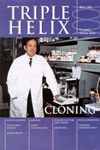Diane Pretty
The Diane Pretty case holds personal interest for Cyberdoc as a member of our church, who died only recently, had also been suffering from Motor Neurone Disease. Using a computer and email to communicate she spoke of her faith in God to the end and valued her life as a precious gift. Of course we can see why those without Christian hope see things rather differently.
The judgement of the law lords on Mrs Pretty’s case makes the point that her appeal was solely on the grounds of the recent Human Rights Act. Many Christian ethicists have argued that the concept of laws based on rights rather than principles such as the absolute value of life are potentially dangerous to a Judeo-Christian legal system.
The BBC News site has an excellent index on euthanasia with reference to this case and others. The pro-life article is unusually robust and talks of a ‘torrent of death in Holland where the elderly are terrified of entering hospital for fear of involuntary euthanasia’. It points out that the ‘right to choose’ could be logically extended in the future from the life of the unborn child to the life of adult dependents. ‘The barbarians are inside the walls.’ If euthanasia is legalised the generation that killed its children may in turn be killed by its surviving children.
Richard Harries
As Bishop of Oxford, Richard Harries has been outspoken on a range of topical issues and is seen by many outside the church as speaking on behalf of mainstream Christianity. But within the church he is a controversial figure who many believe has compromised the gospel message and biblical ethics in an attempt to make them intelligible and attractive to post-moderns. How does the Internet portray him?
On homosexuality: He is quoted on churchnet as strongly supporting a publication on homosexuality which called for a recognition that it was appropriate for some Christians to believe it right for them to enter into a committed same-sex relationship. Another site quotes him as supporting lowering the age of consent for homosexual activity to 16. While neither of these sites provide citations for their sources, they do ring true to speeches found on his official webpages, where he says of homosexuality that it appears ‘inevitable that the church will eventually rethink and repent, as it has in the past in its attitudes to slavery and women’. He also makes clear his opposition to section 28, believing that part of a compassionate attitude to homosexual people includes teaching children about same-sex relationships.
On ethics: His website also includes speeches he has made in the House of Lords. On embryos he has stated:‘'Human life must be respected and protected absolutely from the moment of conception. From the first moment of existence, the human being must be recognised as having the rights of a person - among which is the inviolable right of every innocent being to life.' That is a quotation from the Catechism of the Catholic Church and it is a view I respect deeply but it is not one I share.’ Bishop Harries is, quite clear in one of his House of Lords’ speeches that voluntary euthanasia or assisted suicide is not the route he feels we should be going down believing the Netherlands experiment will prove to be a cul-de-sac.
On the gospel: The Star Wars film The Phantom Menace will ‘reinforce the truth and strength of religion...if people get reassurance that good will overcome evil through a film, far from being a threat to religion, it is an echo of what...the Christian religion, is proclaiming’. One of his thoughts of the day for radio 4 defines the Christian message in the following way ‘Because something, somewhere has gone terribly wrong Jesus came to recreate or reconstitute that society round himself, under the loving wisdom of his heavenly father as he invites people to follow him in the way of love’. His website also explains his involvement with interfaith dialogue and the BBC quotes him as suggesting that people who believe in God but don’t accept Christianity should become Jews.
































